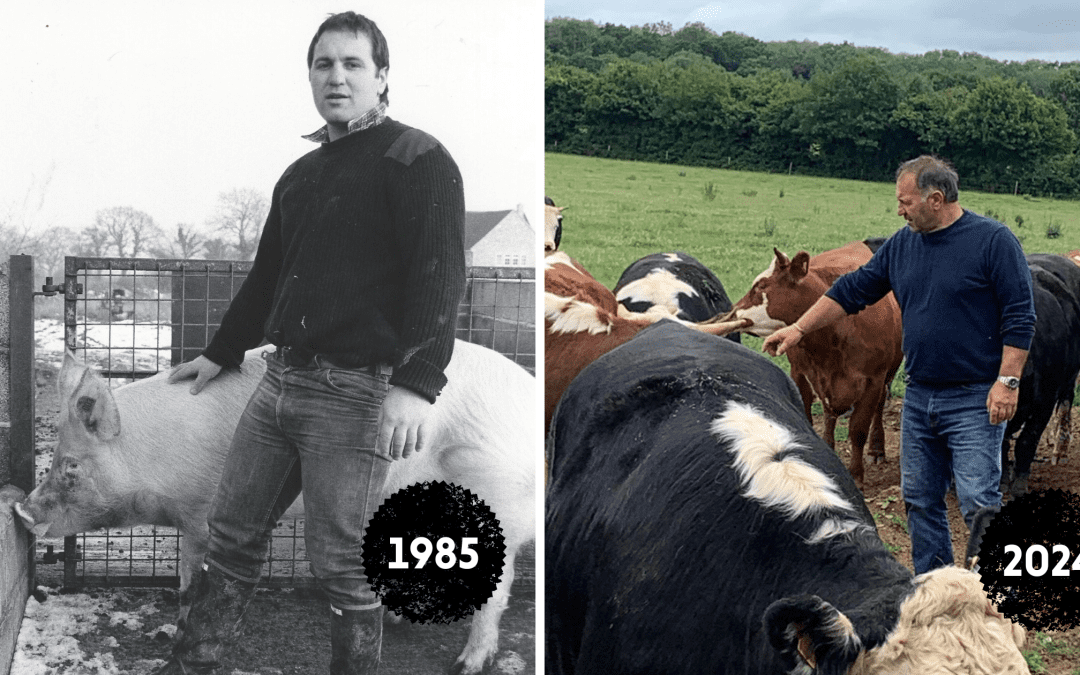Last month, our local parish magazine, The Winsley Weaver, celebrated its 50th anniversary. My father, Richard, was invited to reflect on the changes in the village over the past half-century. For those who missed it, I’m sharing his piece in this week’s journal. So, grab a cuppa and a biscuit, and enjoy hearing what the old man has to say on how life in the village has evolved.
….
As I reflect on the last 50 years of farming and the changes that have shaped the beautiful Cotswold landscape surrounding our village, I’m reminded of my own journey. It’s been half a century since I completed my agricultural studies and began my career on the family farm.
The most significant change has undoubtedly been the impact of technology. Agriculture, once a major employer, relied on simple, basic equipment. Take, for example, the iconic ‘Fordson Major’ tractor, now a nostalgic piece displayed at the Farm Shop. Back then, it cost a few hundred pounds and offered no comforts for the operator! Today’s modern tractors, costing a few hundred thousand pounds, are packed with technology, offering comforts comparable to a premium luxury car.
In those days, an acre of fertile land would yield around 1 to 1.5 tons of wheat; now, it produces over 4 tons. The Winsley Parish once boasted a dozen farms focused on food production; now, only a few diversified farms remain. These farms and the surrounding lanes and footpaths have largely transitioned to supporting recreational activities rather than primarily producing food.
Sitting in my ‘rocking chair’ now, I see that while technological advancements have rapidly increased efficiency, political changes have been just as influential. Fifty years ago, the focus was on maximising food production. Post-WWII food rationing was a fresh memory, and every bit of land was considered vital for food security. Historians point to the poverty and hunger in post-WWI Europe as a root cause of the unrest that led to WWII. Ensuring food security was seen as crucial for maintaining peace.
When we joined the EEC in 1973, the Common Agricultural Policy (CAP) offered incentives and price guarantees, encouraging farmers to expand. It was also an era of cheap oil, making agrichemicals and fertilisers widely available, even for marginal lands like ours. These policies’ environmental impacts are only now becoming clear, and the focus has shifted to environmental protection and regenerative farming. The success of CAP led to surplus production by the 1980s, resulting in the infamous ‘butter mountains’ and ‘wine lakes.’ Farmers were then required to take a percentage of their land out of production to curb waste. Today, less intensive farming has allowed wildlife like hares, buzzards, partridges, and red kites to thrive again.
With production subsidies gone, the reliable supply of food has become a political priority. Farms are now highly regulated and monitored by satellites and drones. We currently import over 50% of our food, and recent events in Eastern Europe have shown how precarious this balance can be.
My career has spanned these dynamic times. The 1980s and ’90s were particularly exciting, with many young people choosing farming as a career. The work was more manual, the hours longer, but we always made it to the pub by closing time! The Plough at Bradford Leigh was our local farmers’ hub, a place for gossip, support, and camaraderie—no social media required! It was also where many of us met our future partners. My wife, Kim, and I raised our three children in this fantastic village. While our daughters initially left for the bright lights, they’ve since returned with their families, rejoining our community. I’ve enjoyed working with my son Tom, who is continuing the family legacy into its sixth generation, focusing on sustainable and regenerative farming, much like my grandfathers did. The farm is bustling again, with various small artisan businesses joining us on-site.
I’ve always loved rugby and am proud to have co-founded the Bradford on Avon Rugby Club in 1982. I remember our first game, with at least half the team comprising local farmers, reflecting our strong community presence. I served as team captain and club chairman, and I’m delighted that we found a corner of our farm to establish the club’s home in Winsley. It’s wonderful to see Tom and my grandchildren playing for the club, which has become a popular venue.
Congratulations to the Weaver teams, both past and present, for keeping our parish magazine informative and engaging. I wonder what topics Tom will discuss 50 years from now during the Weavers’ 100th celebrations. I bet many changes and challenges will stem from climate change. We already notice seasonal shifts on the farm, but perhaps, on a lighter note, Hartley Farm might be producing some fine wines in the future!
Happy Birthday to the Weaver!
Best wishes,
Richard
